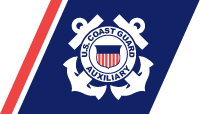Our Public Education Program
The Coast Guard and the Auxiliary believe that education is the best approach to preventing accidents. Members of the Coast Guard Auxiliary present public education programs as a service to the boating public.
The State of Florida requires any individual born after Jan. 1, 1988 to have passed a Safe Boating Course before operating a motorboat, over 10 HP, on public waters. They must carry their Florida Boater Education ID card whenever they operate a power boat of 10 HP or more. The Coast Guard Auxiliary offers the Boat America class to meet this requirement.

Boat America
Boat America is a boating certificate class that offers an in-depth and interesting boating safety course, and provides the knowledge needed to obtain a boating certificate.
Some insurance companies will also offer discounts on boating insurance to boaters who successfully complete this course.
TOPICS INCLUDE
- Introduction to Boating – Types of power boats, boating vocabulary, sailboats, paddle boats, powering boats, and engine types.
- Boating Law – Boat registration, regulations, hull identification numbers, required safety equipment, Federal boating law, state boating law, and reporting accidents.
- Safety Equipment – Life jackets, fire extinguishers, sound-producing devices, visual distress signals, anchors, and other safety equipment.
- Safe Operation and Navigation – Buoys and beacons, aids to navigation, navigation rules, docking, and the dangers of alcohol on the water.
- Boating Emergencies – Hypothermia, boating accidents, man overboard, capsizing, emergency radio calls, carbon monoxide dangers, and weather.
- Trailering – Types of trailers, lights, hitches, towing a trailer.
- Sports and Boating – Water-skiing, hunting and hunting gear, PWC operation, and other boating tips.

GPS for Mariners
Additional subjects covered are: running the simulator, description of all data fields available, proximity waypoints, using the anchor alarm, efficient navigation, communicating with a personal computer, and networking with other instruments.
The recommended presentation of the session involves inviting course participants who already own hand-held GPS units to bring them to the class, increasing interactivity of the educational experience and getting students more involved. However, this class is so effective that even those not possessing handheld units will learn how to use a GPS for practical recreational boating.
This one evening seminar covers the practical application of a marine GPS chartplotter. This session covers the general use of the equipment, different screens, how to enter and edit waypoints and routes. The material follows what is presented in the “GPS for Mariners” textbook.

